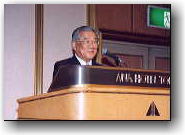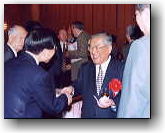Chi Myon Kwan
- Chi Myon Kwan
- Director, Institute of Japanese Studies,
The Hallym Academy of Sciences, Hallym University

I am truly honored to receive this illustrious award. Please allow me to express my heartfelt gratitude.
In South Korea, those of us who are in our 70s have the experience of highly complex feelings toward Japan. Looking back over my life, it seems that I am indeed a member of the generation who was educated and formed its identity under Japanese colonial rule. Those of us in our 70s, may well be the last generation of Koreans who are burdened by these complicated feelings. For us, Japan itself and Korean-Japanese relations will always represent difficult issues that are engraved deeply in our hearts. Indeed, we have ambivalent feelings toward Japan: at times, we reached out our hands, and at times we were not satisfied with Japan's efforts.
In my case, for two decades from 1972, I was given Japan as a home for studying and teaching, and this was during a very difficult period in South Korea's history. My self-awareness of my ambivalent feelings toward Japan was only strengthened by my experience of living here.

When I reached the mandatory retirement age in the spring of 1993, I returned to my native Korea. I believed I would finally be freed from these ambivalent feelings to concentrate on my preferred topic, the history of thought. In actuality, however, I was invited to serve at the Institute of Japanese Studies of Hallym University and thus obliged to confront Korean-Japanese issues head on. At that time, when I reflected on the many Japanese who had taken care of me, encouraged me, and helped me during my over 20 years living in Japan, I also wanted to do my utmost to somehow repay my great debts to them. I am truly thankful that the humble results of my work are being recognized today with this magnificent award.
Because I am from the same generation as President Kim Dae Jung, I came to understand and feel complete sympathy with the president's thoughts about Japan and his efforts to improve Korean-Japanese relations, and I wanted to assist in any way possible. Moreover, I wanted to help establish a new era in Korean-Japanese and Japanese-Korean relations. I think that President Kim has a particular ideology or philosophy regarding Korean-Japanese relations. In the past, some may have believed that wealth and prosperity are achieved by depriving others of their property, but today the understanding is different. My understanding of the president's ideology is that we will enjoy mutual wealth and prosperity and share in the beautiful fruits of our common efforts by promoting the broadest possible exchange and cooperating fully with each other.
It is said that many issues were left unresolved by the "Treaty on Basic Relations between Japan and the Republic of Korea" of 1965, and some have many criticisms of the treaty itself. Nevertheless, we can easily see just how important this treaty has been in launching important exchange between our two nations simply by looking at the bilateral trade statistics, which show that the volume of trade has increased several hundred-fold since the treaty was signed.

In speaking to the Korean people, President Kim Dae Jung has repeatedly stressed that Korea must build up a win-win relationship with Japan, and I pray that this type of win-win relationship will also be established for improving North-South relations on the Korean Peninsula. My heart's desire is that Japan's ties with North Korea will be transformed into the type of win-win relationship that has been established with South Korea, and that this will contribute to peace and prosperity throughout all of East Asia.
In truth, the Japan Foundation Award should be presented to the countless South Koreans who have worked so hard toward this new era. I feel both blessed and humbled to be accepting this award in my own name. Literally translated from the Japanese, the Japan Foundation Award is "an award for encouraging international exchange," and I shall strive to further promote Korean-Japanese relations in order to be worthy of its name.
In fact, there are still many outstanding issues between our two nations, and I will continue to do what little I can to resolve these problems during the remainder of my life. In closing, I would like to thank you all for taking the time out from your busy schedules to join in the celebration of this year's awards, and I wish the Japan Foundation every possible success in its future endeavors. Thank you very much.
- What We Do Top
- Arts and Cultural Exchange [Culture]
- Japanese-Language Education Overseas [Language]
- Japanese-Language Education Overseas [Language] Top
- Learn Japanese-language
- Teach Japanese-language
- Take Japanese-Language Test
- Know about Japanese-language education abroad
- The Japanese-Language Institute, Urawa
- The Japanese-Language Institute, Kansai
- Japanese-Language Programs for Foreign Specified Skilled Worker Candidates
- Japanese Language Education for Japanese Children Resident Overseas and for the Descendants of Migrants
- Archives
- Japanese Studies and Global Partnerships [Dialogue]
- JF digital collection
- Other Programs / Programs to Commemorate Exchange Year
- Awards and Prizes
- Publications
